Place value Teaching Tens and Ones is usually one of the first place value lessons you teach in kindergarten and first grade to introduce place value, so I love to make it a fun one! And what is more fun than ice cream to learn base 10 blocks, tens and ones, expanded form, and number words??
For this lesson, you give students 4-5 cones with a number on them and then they build their ice cream cones by adding the matching scoops. You can easily make it harder or easier by which scoops you choose for them to build with and how many. You could do simply 1 scoop per cone to learn number words, 2 scoops to learn tens and ones and base 10, 3 scoops to add in expanded form, or any combination!
The first full set for this center is teen numbers only (numbers under 20) so they can first practice in a super easy way. I would also recommend only doing 2 scoops at first (base 10 and tens/ones) and doing only teen numbers. Then the next week, do the same center (or small group activity or however you use this) but with any 2 digit number under 50. You can also mix the 2 sets to make a 3rd review center.
What I love most about this place value lesson is how easily you can differentiate so all of your students can get practice at their level and feel successful, while all doing the same activity. The amount of numbers you practice at a time, the number of scoops you choose, and which ones, are all ways to level this center up or down to meet the needs of each of your kids. The recording sheets come in 2, 3, and 4 scoop options to make this super easy.
They also have an example to follow, with the first scoop done for them, so the kids can be self directed and know what a completed ice cream is supposed to look like :) I put all 4 scoops for this picture example to show all the possibilities, but if you were using this green recording sheet with 3 scoops, you’d only have them be matching 3 scoops per cone, so I’d take out the number words option, for example, for each number if I was using this sheet.
Also another fun tip is to print the recording sheet on
color paper like this! Slip it in a sheet protector and let them write their
answers on it using a dry erase marker for extra fun! If it’s just a center and
you don’t care about them turning work in, that’s an easy way to make this more
engaging.
* Number words (twenty-five)
* Base 10 blocks to represent the number
* Tens and Ones (2 tens 5 ones)
* Expanded form (20 + 5)
My favorite way to use these is to use the cones and the
number words only (1 scoop per cone) in the beginning of the year - for simple number words
practice and to teach them HOW to do the activity. Then later, when teaching
place value, do 3 scoops of base 10, tens and ones, and expanded form. (For
kids who struggle, remove the expanded form at first and add it later.) But all
of the ways to differentiate make it a perfect (and fun!) activity that all of
your kids can feel successful practicing place value skills with. Making sure
they LOVE math time is actually more important than them getting the skills
right away. If they keep loving math, they’ll keep working to learn the skills
so math should always feel fun and like an exciting puzzle to solve whenever
possible.
Speaking of puzzles, you know I love puzzles! These puzzles are another super easy and fun way to practice tens and ones.
Have kids simply match the number to the base 10 blocks representation and how many tens and ones it has. Super simple but effective practice! Just like with the ice cream cones, I have a teen numbers only version of the center. This is perfect to do first with your lower groups, or just first in general, or if you’re teaching kindergarten and only doing teen numbers. :)
You can do this for any place value activity, including the ice cream cones. Just have them build the number in blocks (have ten blocks already formed with 10 cubes linked and they stay that way) next to it. Even while completing a simple place value worksheet, they can build their numbers/answers next to it. Letting them manipulate blocks helps them deepen their understanding, and also helps fidgety kids channel their energy in a way that’s connected to the lesson.
Another way some kids love to learn is by coloring. Coloring is a hugely impactful learning tool when used educationally!
For this simple worksheet activity, let them use markers or crayons (I prefer skinny markers for this) to color in the base 10 blocks to represent the number then write how many tens and ones the number has. This is an excellent way to get in tens and ones practice in a very visual and kinesthetic way.
This particular worksheet is from the Groups of Ten section
of my big Place Value Math Unit (that all of these activities I am
showing are included in), but I have these worksheets in a lot of levels and
options for tons of place value practice. The versions inside the unit, where
it looks like this but is only 1 number per page, were so popular that I kept
getting requests to make them for more numbers. So I made a separate pack of all numbers 1-120 so you could do 1 page a day as an easy Number of
the Day morning work activity to do a little place value practice with a new
random number each day. It’s a fun little warm up to get in a little base 10 blocks
and tens and ones practice each day :)
Speaking of Base 10 blocks, these simple little center cards are my favorite way to introduce and practice base ten.
You can never get enough place value blocks practice so why not make it colorful? :) For this center, you cut out these cards and mix them up and lay them out. Kids simply pick a card, figure out the number the blocks represent (and build it themselves if you want), and then write it on their recording sheet next to the matching center. Boom! So easy.
All of the centers, games, and activities in my math units come with student friendly directions like this so they’re so easy to pull out and play. They also always come with teacher/homeschooler directions that are more in depth of how to prep and set it up, ways to make it harder/easier, fun ideas, or anything I felt would be helpful.
Another fun game to teach tens and ones is Place Value Roll! They roll the (included) dice to see how many tens blocks it has and how many ones blocks it has.
What I love most about this activity is it is a sneaky way to consolidate the 2 separate skills of looking at base 10 blocks to know how many tens and ones a number has AND the ability to know what the actual number is. It sets it up in a vertical way where they see how writing how many tens and ones is actually simply writing the number. 4 tens and 2 ones is 42. (This activity is also a great bridge to teaching and learning the value of digits, which I'll write a post about later)
It’s also an easy game for them to play independently over
and over but get different numbers so this could stay in your centers buckets for
weeks! It's also a great activity to throw in your fast finishers bucket for kids who finish their work early to have another thing to choose from.
One way to make Place Value Roll a fun partner game is to have each
partner have their own recording sheet but share dice. They take turns rolling
the dice to build a number. Whoever builds a bigger number for that roll/round circles their number. Whoever has the most circles wins! You can put the recording sheets in sheet protectors and give them dry
erase markers so they can wipe and play again once they fill all the spots to
make it an endless center. Remember when I said what’s better than ice cream?
Endless centers.
For assessment, there are tons of worksheets to use in my place value unit, but I
also love to use cut and paste worksheets as an informal assessment. They’re
the best, in my opinion, because kids can move around their answers and really assess
their own understanding too. I love that they're self-checking and kids see glue as permanent so they often take a moment to proofread, which is a valuable skill in itself.
They’re also just great straightforward practice.
As with everything, I differentiate these too :)
One thing I’ve shown on my blog and on Facebook before is that you can make any cut and paste worksheet into a reusable center by simply using fastener tape so kids can stick the answers on and can pull them off to reset it to be played again. Laminate the papers, put little strips of fastener tape on the sheet and on the answers, and voila - instant "game" for any skill. Scroll to the red Fact Fluency sheets in my Fact Fluency in First Grade blost post if you want to see a picture example.
You can also just simply print on color paper to make it more colorful.
It just looks more fun in color, right?
I'm selective about what I print on color paper since it's more expensive but I love to use it occasionaly to spruce up a "boring" skill.
Anyway, there are so many more activities I could show you for teaching tens and ones during your place value lessons but these are my favorite. I’ll try to write more for the other place value skills (expanded form, groups of ten, value of digits, and all that good stuff!) to show you more ideas & activities from my giant
If you want to see more of what is inside the unit, I also wrote a big Place Value in First Grade blog post that shows more place value activities and ideas too!
You’re also more than welcome to join my free Facebook group
for Teaching Math in First Grade if you want to get more tips and
ideas for early elementary math! I LOVE sharing tips, ideas, and activities. It's also a great place to ask questions and learn from each other. Just make sure you answer all 3 questions to get approved to join the group. I also have a First Grade Phonics group and a couple others if you’re interested in phonics
too!
One tip I’ve shared in the math group specifically for teaching tens and ones is to WRITE the numbers on a “ten” block and a “one” block. This allows kids to visually see exactly what you’re saying when you say “ten” – it is simply ten “ones” blocks grouped together to make counting faster.
This will really help your kids see what the tens and ones blocks actually represent, so I highly recommend doing this for a set of blocks. Write 1-10 on 5 "tens" blocks and 1 on 20 "ones" blocks - and have kids use those to build the numbers you're practicing when first practicing. This is especially effective to use during lessons at your small groups table (teacher table) if you have one.
In general, I think it’s helpful to have place value blocks or math cubes out and available any time you’re learning place value, whether it’s a puzzle or a worksheet or a game. It’s nice to provide that support whenever possible.
If you want all these fun activities, go grab First Grade Math Unit 9: Place Value then join us on Facebook and let’s make math fun!
For more math posts from me, check out:
& more! :) I also write a lot about phonics, literacy, and classroom management so feel free to browse around!
Thanks so much!

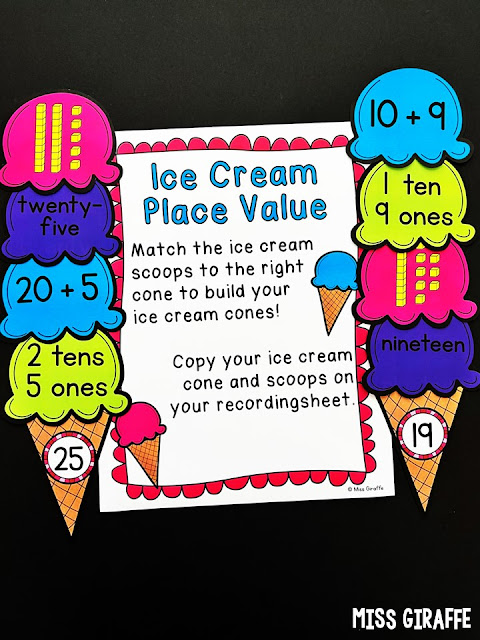
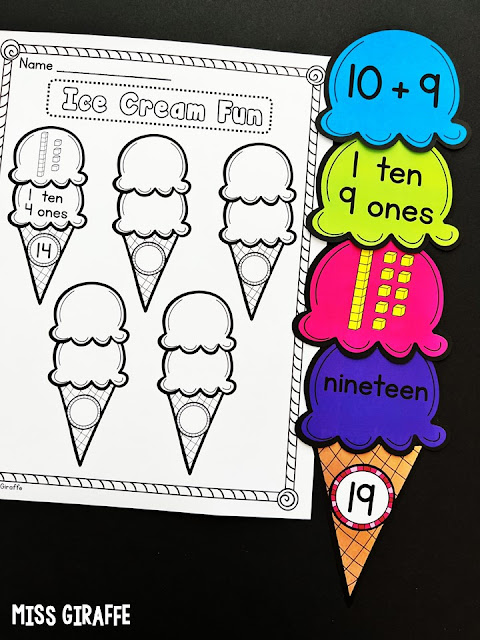




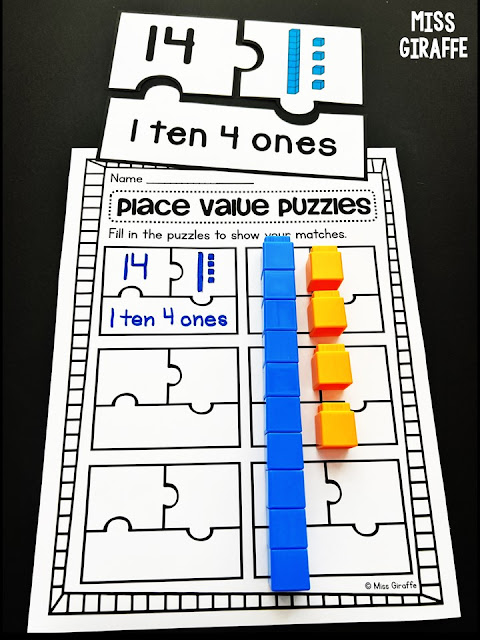

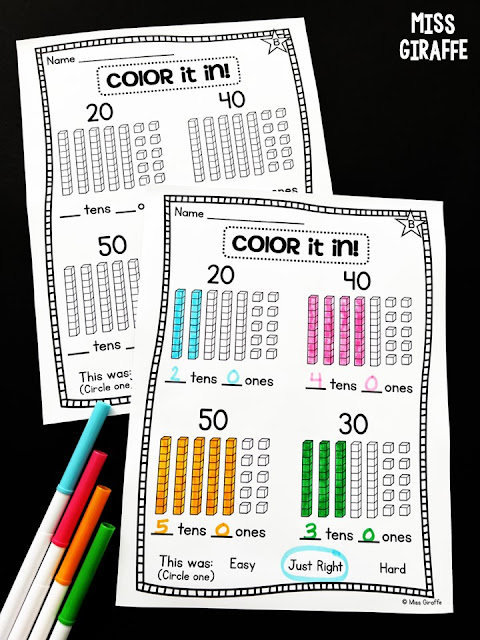
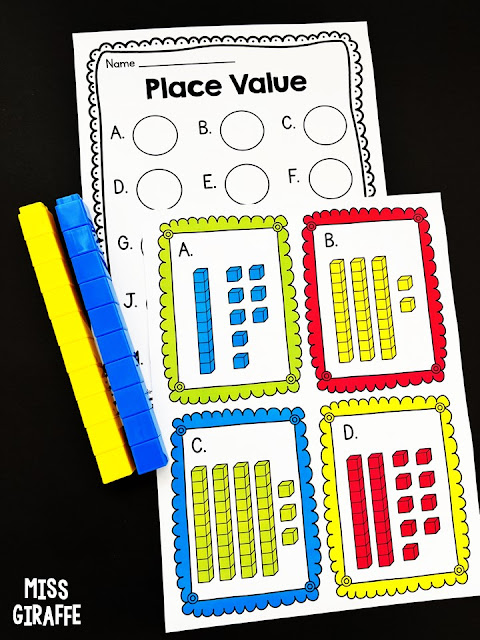



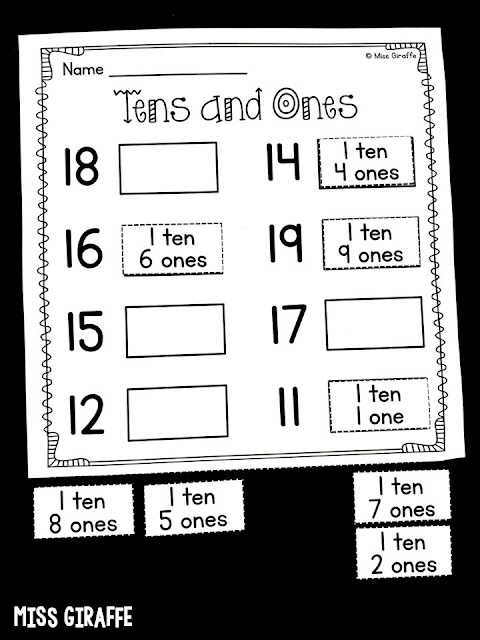
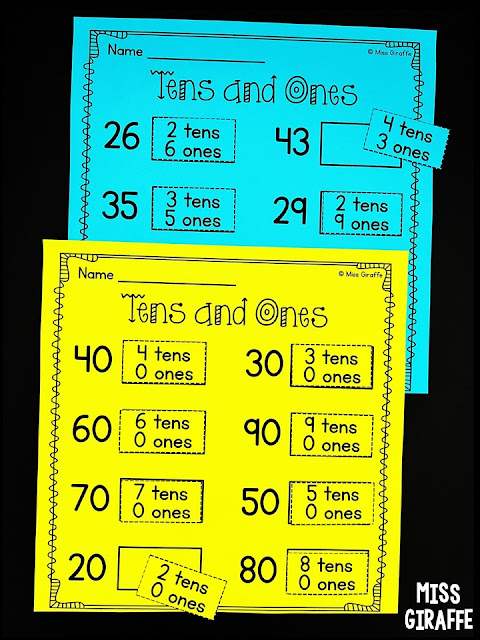



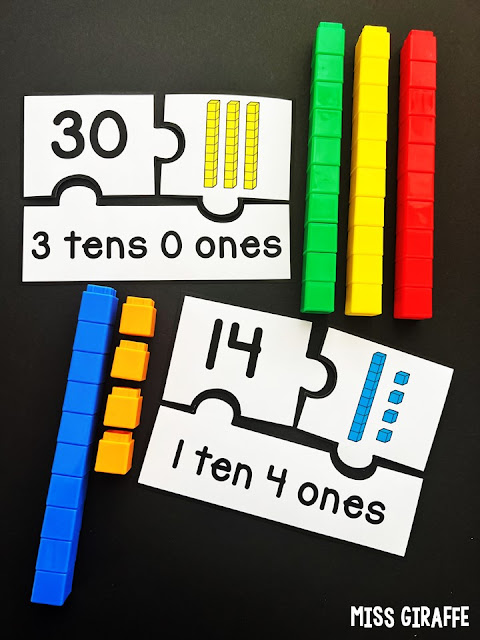



























0 comments:
Post a Comment